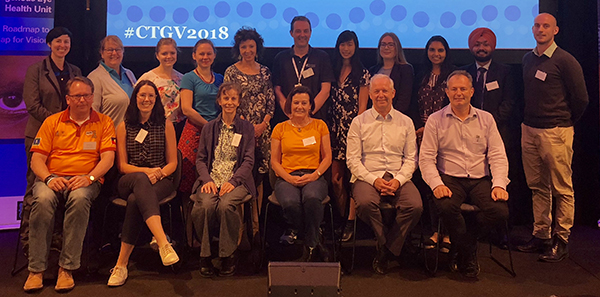1:30min

Seventeen optometrists attended the Close the Gap for Vision by 2020 National Conference held in March
_____________________________
By Rhiannon Riches
Communications Manager
Optometry’s contribution to improving Aboriginal and Torres Strait Islander eye health outcomes was commended at the Close the Gap for Vision by 2020 National Conference.
Optometry was strongly represented at the national conference with 17 optometrists in attendance, alongside Optometry Australia’s CEO Lyn Brodie, National Policy Manager Skye Cappuccio and Policy and Advocacy Manager Sarah Davies.
The Indigenous Eye Health (IEH) unit at the University of Melbourne hosted over 170 delegates at the National Conference on 15-16 March.
Representatives from community groups, clinics, health professions, state and federal governments, peak bodies, Aboriginal health organisations, non-government organisations and government agencies attended.
‘The conference motto, ‘Striving Together’, provided a framework which enabled delegates to celebrate the successes and achievements of the sector while working together to identify the key challenges experienced and solutions required in order to close the gap for vision by 2020,’ Sarah Davies said.
Optometrist and Chair of Optometry Australia’s Aboriginal and Torres Strait Islander Eye Health Advisory Group, Gary Crerie, spoke to delegates on two key topics for optometry: nationally consistent subsidised spectacle schemes and sustainability of the Visiting Optometrists Scheme.
Optometry Australia’s CEO Lyn Brodie participated in a panel of sector peak bodies, calling on the eye health sector to continue to work together to identify innovative solutions which have great impact.
Big thanks to Gary Crerie, Chair of OA’s Aboriginal and Torres Strait Islander Advisory Group, for his excellent presentation on optometry in Indigenous communities and specifically the challenges in ensuring nationally consistent access to subsidised spectacle schemes #CTGV2018 pic.twitter.com/0hHKa298Kb
— Optometry Australia (@OptometryAus) March 16, 2018
Our CEO @LynBrodie1 as part of a panel with @NACCHOAustralia, @healthgovau, @Vision2020Aus and @RANZCOeyedoctor, talking about national collaboration to #CloseTheGap for Vision #CTGV2018 pic.twitter.com/uv3SMZxT2a
— Optometry Australia (@OptometryAus) March 15, 2018
‘A highlight of the conference included an opening address by Federal Health Minister Greg Hunt, who committed to achieving the end of avoidable blindness on his watch,’ Sarah said.
‘Caroline Edwards, Deputy Secretary of Health Systems Policy and Primary Care Group in the Federal Department of Health, supported Minister Hunt, reiterating the Australian Government’s commitment to supporting nationally consistent subsidised spectacle schemes in each state and territory – a key priority in addressing avoidable vision impairment,’ she said.
‘Another highlight was the announcement that ending avoidable Aboriginal and Torres Strait Islander blindness and deafness is included as a national mission of the Medical Research Future Fund.’
Sarah said keynote presentations helped to situate eye health within the broader Aboriginal and Torres Strait Islander health agenda, looking at the role of Aboriginal and Community Controlled Health organisations and community-led health care.
Delegates also came together to celebrate Close the Gap day, acknowledging that sustaining the progress made to date requires consistent attention and support in policy and funding.
Celebrating Close the Gap Day! #ctgv2018 Sustaining progress needs support in policy and funding. @ICEH_LSHTM @OptometryAus @GregHuntMP @brienholden pic.twitter.com/1faWpdXHUk
— Helen Summers (@HelenSummers3) March 15, 2018
Optometry Australia joined with conference partners, Indigenous Eye Health (IEH) at the University of Melbourne, the National Aboriginal Community Controlled Health Organisation (NACCHO), Royal Australian and New Zealand College of Ophthalmologists (RANZCO) and Vision 2020 Australia to commit to continuing to strive together to end avoidable blindness and vision impairment in Aboriginal and Torres Strait Islander communities.
Tagged as: Indigenous eye health